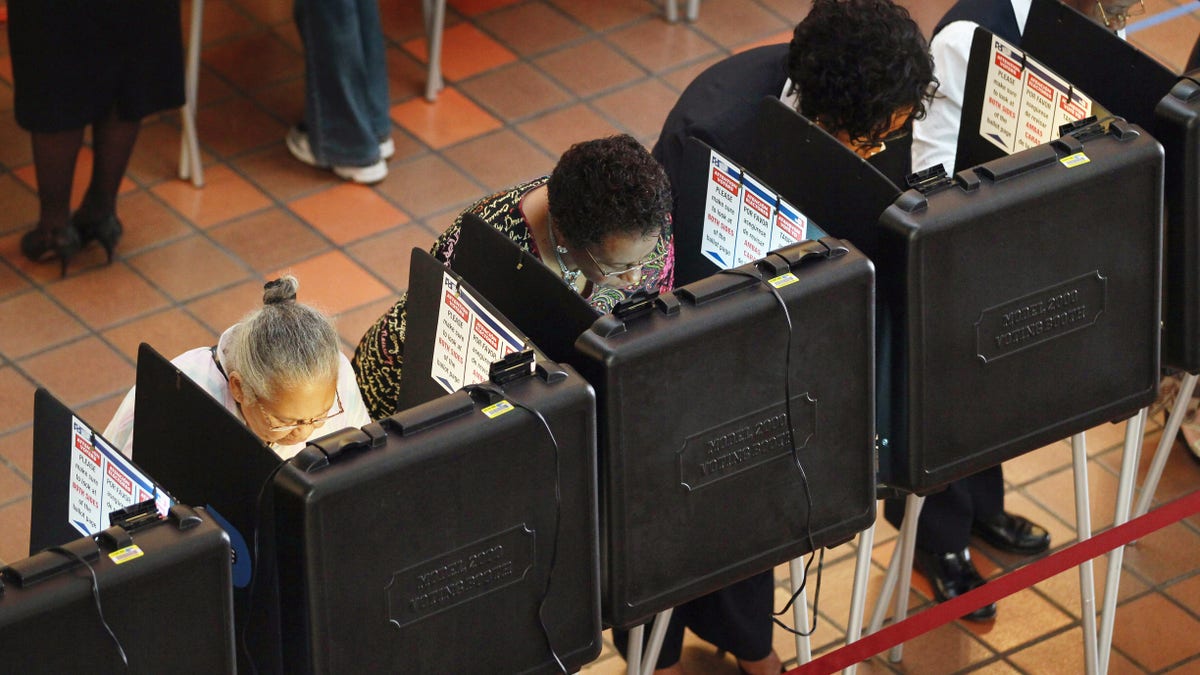
MIAMI - OCTOBER 18: People cast their votes at a polling station set up at the Miami-Dade Government Center on October 18, 2010 in Miami, Florida. Florida residents headed to the polls to cast votes on the first day of early voting in teh midterm elections. (Photo by Joe Raedle/Getty Images) (2010 Getty Images)
Even as a diverse coalition of Americans unite around the principle that voting rights are an essential American principle that needs to be protected, the Republican Party remains firmly committed to doing the opposite. Their continued push for policies that make it more difficult for people to vote disproportionately affects minority and young voters.
Republicans – including leading Presidential candidates – have for years been pushing initiatives that make it harder to vote. Jeb Bush supports states’ efforts to enact voter ID laws, and as governor, he restricted early voting and infamously purged 12,000 eligible voters before the 2000 presidential election. Marco Rubio asked, “What’s the big deal?” with voter ID laws. Scott Walker enacted what has been described as “one of the most restrictive voter ID laws in the country.”
Voter ID laws systematically target Latinos’ and other minorities’ ability to vote. In 2012, measures to restrict voting could have affected over 10 million Latino voters. A Brennan Center for Justice study reported, “In Colorado, Florida, and Virginia, the number of eligible Latino citizens that could be affected by these barriers exceeds the margin of victory in each of those states during the 2008 presidential election.”
And it’s no accident that these laws disproportionately affect Latinos. A separate study from last year found “a solid link between legislator support for voter ID laws and bias toward Latino voters, as measured in their responses to constituent e-mails.” And yet another study that was released earlier this year found that even in states without voter ID laws, Latinos were targeted: “Election officials themselves also appear to be biased against minority voters, and Latinos in particular. For example, poll workers are more likely to ask minority voters to show identification, including in states without voter identification laws.”
Some Republicans have explicitly made known their intentions of suppressing Latino and African-American voters in order to win elections. Over 30 years ago, ALEC-founder and co-founder of the Heritage Foundation Paul Weyrich spoke plainly: “I don’t want everybody to vote…As a matter of fact, our leverage in the elections quite candidly goes up as the voting populace goes down.” Republican after Republican has continued in his footsteps: An Ohio GOP County Chair stated he supports limits on early voting because, “I really actually feel we shouldn’t contort the voting process to accommodate the urban – read African-American – voter-turnout machine.” Pennsylvania House Speaker Mike Turzai believed voter ID laws would “allow Governor Romney to win the state of Pennsylvania.” Former GOP Precinct Chair Don Yelton used the “n” word as he tried to deny that a voter ID law in North Carolina was racist (and he explained that “the law is going to kick the Democrats in the butt”). Conservative activist and notoriously anti-immigrant Phyllis Schlafly said, “The reduction in the number of days allowed for early voting is particularly important because early voting plays a major role in Obama’s ground game.” Schlafly’s Eagle Forum endorsed Marco Rubio in his run for Senate (here’s a lovely picture of the two of them) and applauded Scott Walker for his opposition to legal immigration.
The Republican response to the growing power of minority voters could not be clearer: shut them out of the election process. Under the guise of fighting voter fraud, despite a striking absence of evidence that fraud exists, Republican-led chambers across our nation have moved in concert to restrict access through the polls for political reasons. It’s that simple.
What’s even more upsetting is to hear a group who claims to represent the best interests of a community choose to ignore the facts in favor of their funder’s agenda, namely Daniel Garza, executive director of the Libre Initiative, saying he’s fine with voter ID laws and that he doesn’t think Republicans are trying to suppress the Latino vote.
It’s time for the Republican Party to end their campaign against voting rights—and for people to stop giving them cover when they do it.
